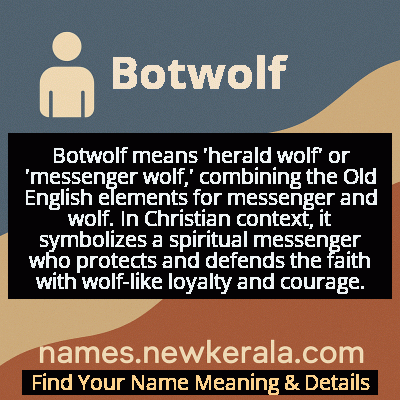Botwolf Name Meaning & Details
Origin, Popularity, Numerology Analysis & Name Meaning of Botwolf
Discover the origin, meaning, and cultural significance of the name BOTWOLF. Delve into its historical roots and explore the lasting impact it has had on communities and traditions.
Name
Botwolf
Gender
Male
Origin
Christian
Lucky Number
3
Meaning of the Name - Botwolf
Botwolf means 'herald wolf' or 'messenger wolf,' combining the Old English elements for messenger and wolf. In Christian context, it symbolizes a spiritual messenger who protects and defends the faith with wolf-like loyalty and courage.
Botwolf - Complete Numerology Analysis
Your Numerology Number
Based on Pythagorean Numerology System
Ruling Planet
Jupiter
Positive Nature
Optimistic, inspirational, and creative.
Negative Traits
Scattered, exaggerating.
Lucky Colours
Yellow, gold, purple.
Lucky Days
Thursday.
Lucky Stones
Yellow sapphire.
Harmony Numbers
1, 2, 9.
Best Suited Professions
Arts, writing, communication.
What People Like About You
Creativity, optimism.
Famous People Named Botwolf
Botwolf of Mercia
Christian Missionary
Early Anglo-Saxon missionary who helped establish Christian communities in rural England
Botwolf the Chronicler
Monk and Historian
Authored important ecclesiastical records documenting the Christianization of Anglo-Saxon England
Saint Botwolf
Abbot
Founded a monastery in East Anglia and was venerated as a local saint for his piety and leadership
Botwolf of York
Church Administrator
Served as a key administrator in the York diocese during the Viking invasions
Name Variations & International Equivalents
Click on blue names to explore their detailed meanings. Gray names with will be available soon.
Cultural & Historical Significance
The name appears in various ecclesiastical records and chronicles from the Anglo-Saxon period, often associated with missionaries and church leaders who worked to spread Christianity in rural areas. Its usage reflects the complex cultural transition from pagan Anglo-Saxon traditions to Christian practices, where older naming conventions were adapted to serve new religious purposes. The name's persistence through the medieval period demonstrates how early Christian leaders in England often maintained names that connected them to their cultural heritage while serving their religious mission, creating a bridge between old and new belief systems.
Extended Personality Analysis
Individuals named Botwolf are typically perceived as possessing a unique blend of spiritual dedication and protective strength. They often exhibit leadership qualities combined with a deep sense of responsibility toward their community or cause. The 'herald' aspect of the name suggests someone who is communicative, persuasive, and dedicated to spreading important messages or ideals, while the 'wolf' component indicates loyalty, courage, and protective instincts. These individuals tend to be strategic thinkers who can navigate complex situations with both wisdom and determination.
They often display a strong moral compass and are willing to defend their beliefs vigorously, yet they typically do so with thoughtful consideration rather than brute force. The combination creates a personality that is both intellectually and spiritually engaged, capable of inspiring others while providing steadfast protection and guidance. In social contexts, Botwolfs are often seen as reliable pillars of their communities, combining the messenger's role of communication with the wolf's role of guardian, making them natural leaders in both spiritual and practical matters.
Modern Usage & Popularity
In contemporary times, Botwolf is an extremely rare name, primarily used by families with strong interests in Anglo-Saxon history, early Christian traditions, or unique historical names. It occasionally appears in historical reenactment communities or among scholars specializing in medieval English history. The name has never ranked in modern baby name databases and remains largely confined to academic or historical interest circles. However, there has been a minor resurgence of interest in such ancient names as parents seek distinctive names with deep historical roots and meaningful symbolism. Some modern parents drawn to the name appreciate its combination of spiritual and protective elements, seeing it as representing both message-bearing and guardianship qualities that they hope to instill in their children.
Symbolic & Spiritual Meanings
Symbolically, Botwolf represents the fusion of spiritual mission with protective strength. The 'herald' component symbolizes communication, divine messaging, and the spreading of important truths or teachings. The 'wolf' element carries rich symbolism including loyalty to one's pack (community), courage in facing challenges, protective instincts, and keen perception. In Christian context, the wolf symbolism is transformed from its pagan associations with predation to represent the 'good shepherd' who protects the flock from spiritual dangers. The combination creates a powerful metaphor for someone who both proclaims important messages and defends the community that receives them, making the name particularly resonant for leadership roles that require both visionary communication and practical protection of values and people.

